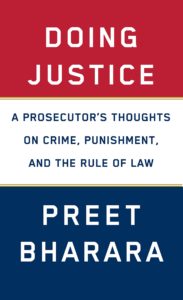 This is an entrancing, literate, and thought-provoking review of the experiences of the former U. S Attorney for the fabled Southern District of New York, now on the faculty of the NYU School of Law.
This is an entrancing, literate, and thought-provoking review of the experiences of the former U. S Attorney for the fabled Southern District of New York, now on the faculty of the NYU School of Law.
“Justice is a broad and hazy subject”, he writes. “It is one of the most elusive and debatable concepts known to mankind, and disagreements over its meaning have spawned revolutions, religions, and civil wars.” He argues its importance as “it seems preferred these days to demonize one’s opponents rather than engage them, to bludgeon critics rather than win them over. There is creeping contempt for the truth and expertise. Rigor is wanting everywhere. We swim in lies, never corrected … This moment in America (is) alarming.”
This is an odyssey of Bharara’s own experiences, focusing on many legal cases, a continuing search for “justice” found in engaging stories of human frailty. He argues for balance: “I have not only a healthy skepticism for the potential guilt of any suspect but also the necessary converse, skepticism of the innocence of any person.” He adds, “the key is to make sure that prudent hesitation does not turn into paralysis and that responsible aggressiveness does not turn into recklessness.”
His chapter on “Confirmation Bias”, natural to all of us, argues that every conclusion must be subject to challenge and revision.” That on “Curiosity and Query” suggests that “dumb questions” are often the best to ask. That on “The Principles of Interrogation” note that “patience and humanity outperform threats and brute force every times” as proven in experience at Guantanamo. That on “Continuity and Change” concludes that “mindless adherence to old ways is, I think, worthy of mockery. Tradition is good and useful and grounding. But lazy habit and knee-jerk hostility to change are not tradition: they are an intellectual strati jacket.”
Bharara presents his thoughts because, he argues, today “a crisis persists in public discourse and political debate. It is coarse and vicious and tone-deaf. Truth is a victim of self-interest and extreme tribalism, as are decorum and respect. The very notion of civility — and even the need for it – are hotly debated. Meanwhile the political tribes insulate themselves more than ever.”
This worried lawyer concludes with some cogent counsel: (1) “Justice, as I keep repeating, is done by human beings.” (2) Much of the time, your most important job as a lawyer is not to talk; it is to listen.” And (3) “ … probability is not certainty, and the uncertainty is always palpable.”.
I have a young grand-daughter, who has expressed interest in the law: I’m sending a copy of Preet Bharara’s challenging book to her to encourage that interest.
Editor’s Note: ‘Doing Justice’ by Preet Bharara was published by Alfred A. Knopf, New York in 2019.

About the Author: Felix Kloman is a sailor, rower, husband, father, grandfather, retired management consultant and, above all, a curious reader and writer. He’s explored how we as human beings and organizations respond to ever-present uncertainty in two books, ‘Mumpsimus Revisited’ (2005) and ‘The Fantods of Risk’ (2008). A 20-year resident of Lyme, he now writes book reviews, mostly of non-fiction, which explores our minds, our behavior, our politics and our history. But he does throw in a novel here and there. For more than 50 years, he’s put together the 17 syllables that comprise haiku, the traditional Japanese poetry, and now serves as the self-appointed “poet laureate” of Ashlawn Farm Coffee, where he may be seen on Friday mornings. His late wife, Ann, was also a writer, but of mystery novels, all of which begin in a village in midcoast Maine, strangely reminiscent of the town she and her husband visited every summer.